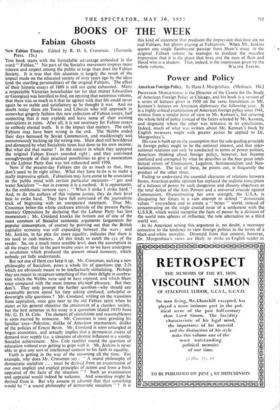BOOKS OF THE WEEK
Fabian Ghosts
THIS book starts with the formidable advantage embodied in the word " Fabian." No part of the Socialist movement inspires more interest and respect among the public at large than does the Fabian Society. It is true that this situation is largely the result of the impact made on the educated society of sixty years ago by the ideas (and the startling personalities) of the original Fabians. The effect of their historic essays of 1889 is still not quite exhausted. Many a respectable Victorian householder (or for that matter Edwardian or Georgian) was horrified to find, on opening that notorious volume, that there was so much in it that he agreed with that life could never again be so stable and satisfactory as he thought it was. And no doubt today there are Tories and Liberals who will approach in somewhat gingerly fashion this new collection of Fabian essays, half suspecting that it may explode and leave some of their existing convictions in ruins. After all, it is not necessary for Fabian essays to embody eternal truth. It is the impact that matters. The early Fabians may have been wrong in the end. The- Webbs ended their days bemused by Soviet Communism, and maddeningly and monotonously barking up the wrong tree. Shaw died still bewildered and dismayed by what Socialistic taxes had done to his own income. But what did that matter ? In the context in which they appeared the original Fabian Essays sounded right ; and they convinced enough people of their practical possibilities to give a momentum to the Labour Party that was not exhausted until 1950.
Now if the present-day Fabians can do as much as that, they don't need to be right either. What they have to do is to make a really impressive splash. Fabianism may have come to be associated in the public mind with certain particular measures—" gas and water Socialism "—but in essence it is a method. It is opportunist. As the emblematic tortoise says : " When I strike I strike hard." And, to do the authors of this volume justice, they do their level best to strike hard. They have full command of the journalistic trick of beginning with an unexpected statement. Thus Mr. Crossman belies, the whole cocksure attitude of the present Parlia- mentary Opposition by declaring that the Labour Party has lost momentum ; Mr. Crosland knocks the bottom out of one of the most common of Socialist economic arguments (arguments for popular consumption, of course) by pointing out that the British capitalist economy was still expanding between the wars ; and Mr. Jenkins, in his plea for more equality, indicates that there is no need to rush matters. All this tends to catch the eye of the reader. So, on a much more sensible level, does the assumption in all the essays that in the past twelve years or so we have undergone a revolution which produced the present mixed economy, which nobody yet fully understands.
But not one of them can keep it up. Mr. Crossman, seeking a new philosophy of Socialism, poses a whole list of questions (pp. 2-3) which are obviously meant to be intellectually stimulating. Perhaps they are meant to recapture something of that sheer delight in cerebra- tion which the Webbs were said to have enjoyed, and which Shaw once compared with the most intense physical pleasure. But they don't. They only prompt the further question—why should any reasonable person spend his time asking confused, unhelpful or downright silly questions ? Mr. Crosland, writing on the transition from capitalism, once gets near to the old Fabian spirit when he states as his general objective the attainment of a classless society, but the best sentence in his essay is a quotation (dated 1935) from Mr. G. D. H. Cole. The element of stimulation and reasonableness is soon marred by nonsense. Mr. Crossman is soon grinding his familiar axes—Palestine, dislike of American rearmament, dislike of the policies of Ernest Bevin. Mr. Crosland is soon entangled in bogus economics, and actually implies that a permanent excess of demand over supply (i.e. a situation of chronic inflation) is a worthy Socialist achievement. Mrs. Cole rambles round the question of education without ever getting to grips with it. Mr. Jenkins is never able to give any sort of intellectual content to his faith in equality. Faith is getting in the way of the reasoning all the time. For example, why does Mr. Crossman say : " A sound philosophy of democratic socialism . . . must be derived from an examination of our own implicit and explicit principles of action and from a fresh appraisal of the facts of the situation " ? Such an examination and appraiial would indeed be welcome. And something might be derived from it. But why assume in advance that that something would be " a sound philosophy of democratic socialism " ? It is this kind of statement that produces the impression that here are no real Fabians, but ghosts playing at Fabianism. When Mr. Jenkins quotes one single flamboyant passage from Shaw's essay in the original Fabian volume he manages to produce the macabre impression that it is the ghost that lives and the man of flesh and blood who is a shadow. That, indeed, is the impression given by the










































 Previous page
Previous page